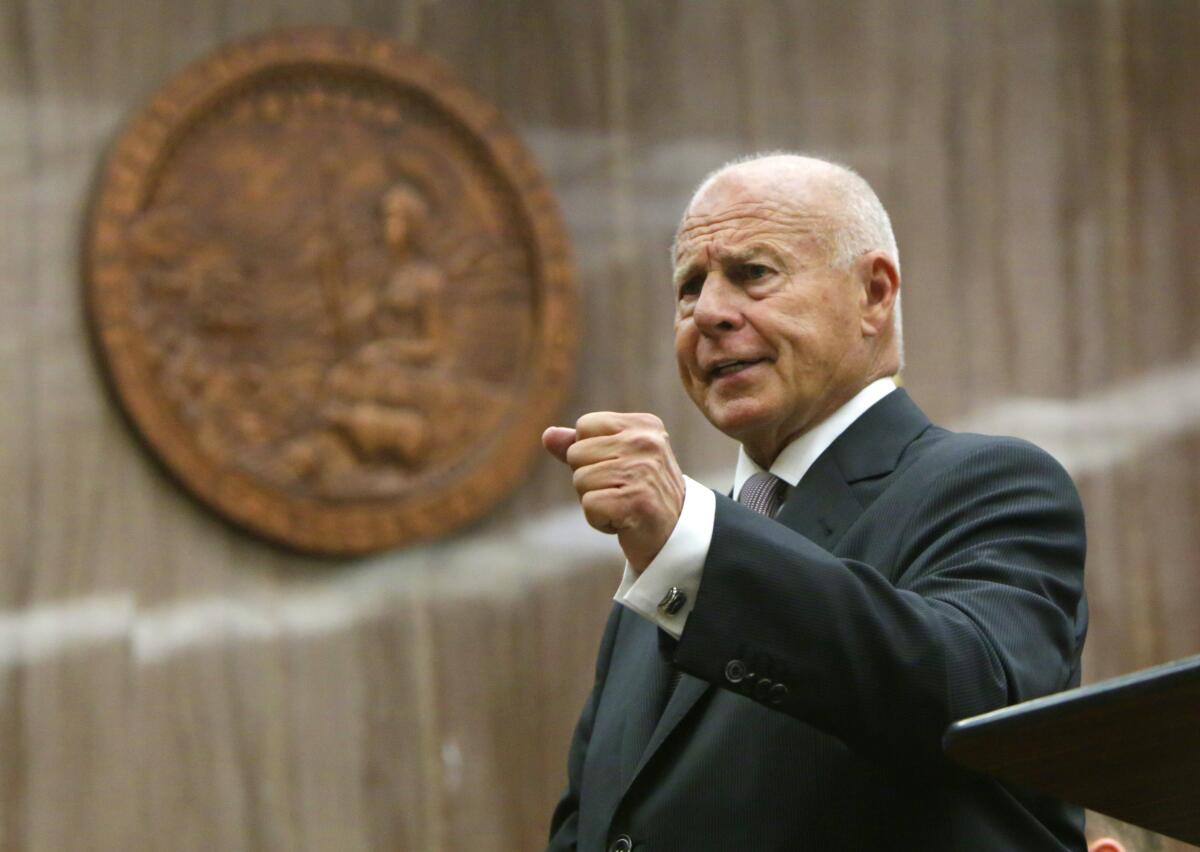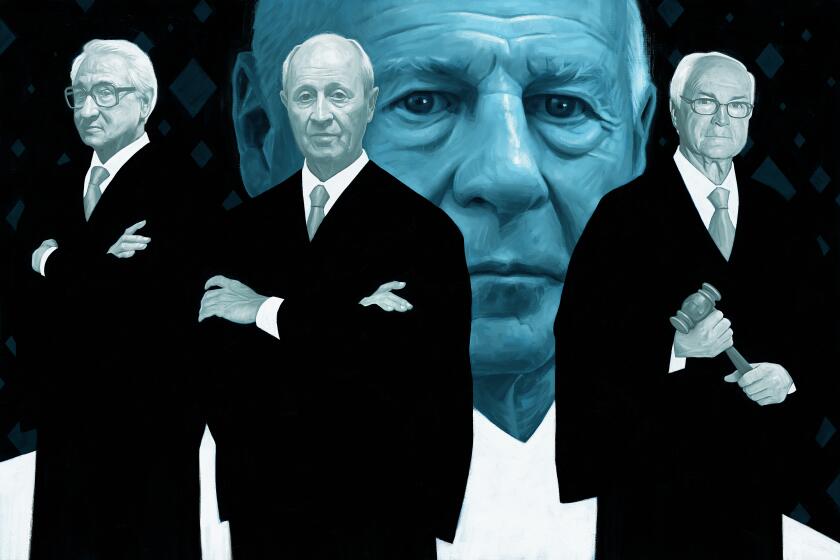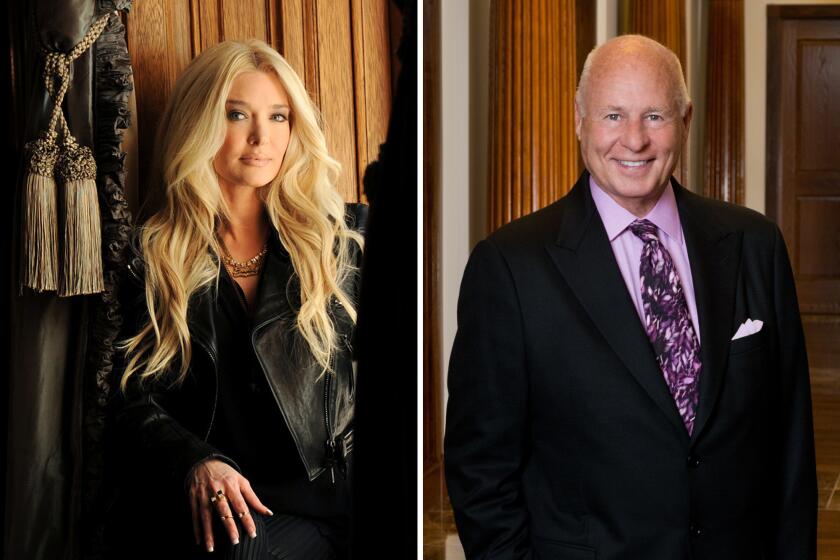When it comes to crooked colleagues, California lawyers can remain silent

- Share via
When a blue-ribbon commission met in 2015 to improve attorney ethics rules in California, a federal prosecutor named George Cardona was tasked with researching a proposed rule requiring lawyers to report misconduct by peers.
Forty-seven states already had mandatory reporting laws and two others had statutes stating that lawyers should make such reports. California was the lone exception. In the Golden State, there was no expectation — much less an obligation — that lawyers alert authorities to wrongdoing in their ranks, no matter how egregious or damaging the misconduct.
Still, after much debate, Cardona and the majority of commissioners rejected the proposal.
Seven years later, Cardona has a new job and a different opinion. As the State Bar’s chief trial counsel, or top prosecutor of attorneys, he grapples daily with the wreckage of the Tom Girardi scandal, in which one of the state’s most prominent attorneys got away with misappropriating client money for decades.
“One of my overriding goals is to kind of restore confidence in the discipline system. And I think, ultimately, an adoption of a rule like this might help that,” Cardona told The Times recently.
California’s legal community, which with 266,000 lawyers is the nation’s largest, has long resisted a mandatory reporting law. Some opponents have cited the state’s uniquely broad client confidentiality obligations, while others express a general disdain for telling on any fellow member of the profession, regardless of how compromised.
A Times investigation draws on newly revealed records about Tom Girardi’s legal practice, opening a window onto the secretive world of private judges.
The feeling that reporting unethical behavior is disloyal is so prevalent in California that many attorneys and the State Bar, the public agency that polices the legal field, have used mob parlance to refer to the requirement as the “snitch” or “rat” rule.
That contrasts with the prevailing view in other states. In Louisiana, where a version of the rule has been on the books for 35 years, “it’s not the subject of a lot of conversation or angst,” said Charles Plattsmier, who has been the top prosecutor at the Louisiana Office of Disciplinary Counsel since 1996. Lawyers “recognize it’s a duty they have and we get pretty good compliance.”
Though the number of mandatory reports he receives is small, he said, “it is usually some of the most significant reporting we get. It alerts us to some of the most serious misconduct that we need to act on quickly to alert the public.”
In Girardi’s case, there was evidence in court cases as early as the 1990s that he was mishandling settlement money and stiffing colleagues out of legal fees, but fellow attorneys have said they were reluctant to turn in the powerful litigator to the State Bar. Girardi cultivated influence with the agency’s investigators and other officials and avoided any discipline until his firm’s collapse two years ago.
In fact, it was lawyers not in California but in a state with a tough reporting law — Illinois — that ultimately brought down Girardi. In 2020, a Chicago firm working with him in a suit over an airline crash went to the judge handling the case about millions of dollars the L.A. lawyer had failed to pay widows and orphans.
U.S. District Judge Thomas Durkin in Chicago referred Girardi to federal prosecutors for investigation and embarked on a probe into what two other attorneys at his firm, Girardi Keese, knew and did about the misappropriated air crash settlements.
Times reporting has played a starring role in ‘The Real Housewives of Beverly Hills’ this season. Here’s our guide to Erika Jayne and Tom Girardi.
Testimony at a hearing last year showed that Girardi’s son-in law, David Lira, and another veteran lawyer at the firm, Keith Griffin, knew he had held back settlement money and was stringing along the grieving families with letters containing phony excuses. Neither reported Girardi to the State Bar — and indeed they were not obligated to do so under California’s rules.
“I’m convinced that Mr. Griffin and Mr. Lira knew these letters were outrageously false,” the judge said during one hearing. He has yet to rule on whether the pair should be held in contempt.
Both Lira and Griffin have denied wrongdoing, saying they were employees of the firm who had no control over their boss’ actions or handling of money.
Other testimony underscored the idea that Girardi’s ethical failures were widely known in his home state. Two witnesses from the Chicago firm testified that when they consulted with another L.A. attorney, Robert Finnerty, who had spent years working at Girardi Keese, he advised them to find a quiet solution for the missing settlement funds.
“Everyone has known that Tom has been stealing money for years,” Chicago lawyer Jay Edelson quoted Finnerty as telling him. Edelson testified that what seemed to be tacit acceptance of Girardi’s thieving left him disgusted. “I needed to take like 15 showers after that.”
Finnerty did not testify at the hearing. In an interview, he disputed the testimony: “I did not say any of those words.” He acknowledged knowing that Girardi had stolen millions from another client, a burn victim and his family, two years earlier, which prompted him to leave the firm. He said that at that time, he looked into whether California had a mandatory reporting law.
“I was surprised we didn’t have one,” he said. He did not notify authorities, though he did help the burn victim’s family secure a judgment against Girardi.
The State Bar is investigating Girardi’s colleagues Lira and Griffin for their representation of the air crash clients, according to correspondence with Edelson reviewed by The Times. In a letter last year, a State Bar prosecutor wrote that the lack of a mandatory reporting law precluded a wide investigation into what they knew about corruption at the firm.
The murky provenance of high-end jewelry and the earrings that became a plot point in the downfall of high-flying lawyer Tom Girardi, husband of “Real Housewives of Beverly Hills” reality star Erika Jayne.
Edelson, whose firm sought the broader investigation, said that in one phone conversation, State Bar prosecutors referred to the law as a “snitch rule.” The phrase also appeared in a State Bar publication a dozen years ago.
Cardona, the bar’s head prosecutor, said he finds the nickname “unfortunate,” adding, “It should be viewed as a rule that would basically impose duties on attorneys to participate in making sure that the profession is operating appropriately.”
The basis for the mandatory reporting laws in other states is a model rule drawn up by the American Bar Assn. in 1983: “A lawyer who knows that another lawyer has committed a violation … that raises a substantial question as to that lawyer’s honesty, trustworthiness or fitness as a lawyer in other respects, shall inform the appropriate professional authority.”
The law varies from state to state, with some jurisdictions setting stricter or looser standards for the misconduct to be reported and Georgia and Washington using language that makes reporting a colleague an expectation but not a requirement.
There is no current data publicly available about how often attorneys in states with the laws report misconduct or how frequently those complaints result in fruitful investigations.
Some states, including Louisiana, have a history of going after those who fail to make obligatory reports. The most dramatic case in the Bayou State involved a former prosecutor dying of cancer who confided in an attorney friend that he had withheld exculpatory blood evidence in a case years before.
The friend did not alert authorities. Five years later, a man the former prosecutor had tried for murder was about to be put to death by lethal injection. His defense uncovered the exonerating blood evidence just a month before his scheduled execution. The attorney friend then came forward and testified about the former prosecutor’s confession at a hearing, but officials still prosecuted him for violating the mandatory reporting law. He kept his license but was publicly reprimanded.
California first contemplated and rejected a mandatory reporting law in the 1980s. Its legal community traditionally regarded itself as too big and well-established to need guidance from an outside group like the ABA. Additionally, some lawyers felt it would be difficult to square with the state’s expansive confidentiality obligations, which bind a lawyer to keep secret any information he or she acquires through representing a client unless the client agrees otherwise. (Attorneys are permitted to reveal confidential information to prevent “a criminal act that the attorney reasonably believes is likely to result in death of, or substantial bodily harm to, an individual.”)
Tom Girardi is facing the collapse of everything he holds dear: his law firm, marriage to Erika Girardi, and reputation as a champion for the downtrodden.
Two decades later, in 2010, a State Bar commission came up with what appeared to be a solution, a proposal that required attorneys to report misconduct if it didn’t violate their confidentiality obligations and the misconduct amounted to “a felonious criminal act.”
Kevin Mohr, a professor at Western State College of Law and a consultant to the commission, knew the idea was controversial with rank-and-file lawyers across the state but, he said, “I thought the rule that was proposed was sufficiently nuanced that [State Bar’s governing board] might accept it.”
They did not. After contentious debates in which some speakers spoke derisively of “snitching,” the measure was defeated. A reconsideration in 2016 also failed.
“There was … a question as to just how effective this would be,” recalled Cardona of that decision.
Though he has rethought his position, other commissioners interviewed said they had not.
Toby Rothschild, the former general counsel of Legal Aid Foundation of L.A., said the job of a lawyer is to represent clients.
“Tattling is not a part of it,” he said. Though some attorneys do report misdeeds voluntarily, he said, “there should be some judgment. A lawyer should be able to say … Is it going to help or hurt my client to make a report?”
Another commissioner, Glendale attorney James Ham, called a mandatory reporting statute “window dressing” that would do little to stop actual misconduct and trigger a barrage of baseless reports.
“Lawyers are constantly trying to complain that the other side violated this or that rule,” Ham said. “A snitch rule would just make it worse.”
There were similar predictions a decade ago when Kentucky became one of the final states to adopt a version of the mandatory rule.
“There was a worry there would be a ‘tsunami’ of reports by lawyers against other lawyers upon the rule becoming effective,” Jane Herrick, the chief bar counsel at the Kentucky Bar Assn., said in an email. “That never materialized.”
She said her office has yet to discipline anyone for failing to turn in a colleague, but that attorneys “generally comply.”
Many who oppose the laws point out that there is nothing to stop California attorneys from currently reporting one another to the State Bar. Supporters don’t find that argument convincing.
“It’s about norms. It’s changing what the usual behavior is,” said Tim Casey, a professor at California Western School of Law. “Having an obligation … gives lawyers in some ways cover to say, ‘I didn’t have a choice here, I had to report this.’”
More to Read
Sign up for Essential California
The most important California stories and recommendations in your inbox every morning.
You may occasionally receive promotional content from the Los Angeles Times.















